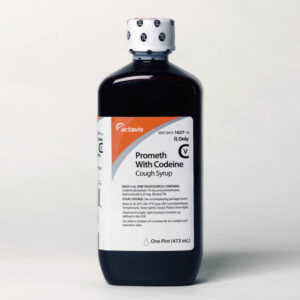Promethazine with Codeine syrup
$280.00
Promethazine with Codeine Syrup: A Comprehensive Overview.
Description:
Promethazine with codeine syrup is a widely prescribed medication combining two powerful agents: promethazine, an antihistamine, and codeine, an opioid cough suppressant. This medication is effective for managing symptoms of respiratory conditions such as cough, runny nose, and sneezing associated with allergies, colds, and infections. However, its use requires careful attention due to potential side effects and risks. This article provides a detailed exploration of promethazine with codeine syrup, addressing common questions, uses, precautions, and safety concerns, and concludes with guidance for its responsible use.
What is Promethazine with Codeine Syrup?
Promethazine with codeine syrup is a combination medication containing two active ingredients. Promethazine is an antihistamine that blocks histamine receptors, alleviating allergy symptoms such as sneezing and a runny nose. Codeine, an opioid, suppresses the urge to cough by acting on the brain’s cough reflex center. This combination makes it particularly effective in treating upper respiratory symptoms related to colds, flu, or allergies. Due to the presence of codeine, a controlled substance, this medication is available only by prescription.

What is Promethazine with Codeine Used For?
This medication is prescribed to treat symptoms such as persistent coughing, runny nose, sneezing, and postnasal drip. It is especially useful in managing these symptoms when they disrupt sleep or daily activities. Additionally, promethazine helps alleviate nausea or vomiting caused by certain illnesses. However, it is not recommended for use in conditions requiring long-term cough suppression, as it does not address underlying infections or illnesses. Promethazine with codeine syrup is often reserved for short-term relief due to its potential for dependency.
How Does Promethazine with Codeine Work?
Promethazine acts by blocking histamine, a compound in the body responsible for allergy symptoms. By reducing histamine activity, it alleviates symptoms such as runny nose, itching, and watery eyes. Codeine, on the other hand, is a mild opioid that suppresses the brain’s cough reflex, providing relief from persistent coughing. Together, these ingredients make this syrup highly effective in managing cold and allergy symptoms, but its opioid component necessitates careful monitoring to prevent misuse.
What Are the Common Side Effects?
Common side effects of promethazine with codeine include drowsiness, dizziness, dry mouth, nausea, vomiting, and constipation. Some individuals may also experience blurred vision or difficulty urinating. Serious side effects, such as respiratory depression, confusion, or allergic reactions (e.g., rash, swelling, difficulty breathing), are rare but require immediate medical attention. Children, elderly individuals, and those with existing respiratory issues are at higher risk of severe side effects. Monitoring for these effects is crucial to ensure safe usage.
Is Promethazine with Codeine Addictive?
Yes, this medication has a potential for addiction due to its codeine content. Codeine is an opioid that can cause physical and psychological dependence when misused. Patients using the syrup in higher doses or for longer periods than prescribed may develop tolerance, requiring increasing amounts to achieve the same effect. This misuse can lead to addiction, withdrawal symptoms, or overdose. Healthcare providers often prescribe it with caution and educate patients about its addictive potential.
What Are the Risks of Misuse?
Misuse of promethazine with codeine syrup can lead to severe consequences, including respiratory depression, overdose, and death. Recreational use, often referred to as “lean” or “purple drank,” involves mixing the syrup with sugary beverages, which can mask its potency and increase the risk of adverse effects. Overuse of this medication, whether intentional or accidental, can also lead to long-term health issues, including liver damage and opioid dependency. Education and proper use are essential to prevent these risks.

How Should Promethazine with Codeine Be Taken?
Promethazine with codeine syrup should be taken exactly as prescribed by a healthcare provider. Dosage is typically determined based on the patient’s age, weight, and severity of symptoms. It is important to use a proper measuring device to ensure accurate dosing. Patients should avoid exceeding the prescribed amount or frequency. If a dose is missed, it should be taken as soon as possible unless it is close to the next scheduled dose. Never double up doses to make up for a missed one.
Who Should Avoid Using This Syrup?
Certain individuals should avoid promethazine with codeine syrup. These include:
1. Children under 12 years of age, due to the risk of respiratory depression.
2. Pregnant or breastfeeding women, as codeine can harm the fetus or infant.
3. People with respiratory issues such as asthma or COPD.
4. Those with a history of substance abuse or opioid dependency.
Before prescribing this medication, healthcare providers typically review the patient’s medical history to ensure it is safe and appropriate.
What Should I Avoid While Taking This Medication?
While using this syrup, it is crucial to avoid:
• Alcohol, as it can increase the sedative effects and risk of respiratory depression.
• Operating heavy machinery or driving due to drowsiness.
• Other medications that cause drowsiness, such as sedatives or sleep aids, without consulting a doctor.
These precautions minimize the risk of side effects and ensure safe use of the medication.
What Are the Signs of an Overdose?
Signs of an overdose include extreme drowsiness, confusion, slow or shallow breathing, cold or clammy skin, and loss of consciousness. An overdose of promethazine with codeine can be life-threatening and requires immediate medical attention. Administering naloxone, an opioid-reversal drug, can temporarily counteract the effects of a codeine overdose until emergency care is available. Early recognition of symptoms is critical in preventing fatal outcomes.

How Should Promethazine with Codeine Be Stored?
Proper storage of this medication ensures its effectiveness and prevents accidental ingestion or misuse. The syrup should be stored at room temperature, away from heat, moisture, and direct sunlight. It should be kept in a secure location, out of reach of children and pets. Patients should also dispose of unused or expired medication according to local regulations or pharmacy guidelines to prevent potential misuse.
Can Promethazine with Codeine Be Taken During Pregnancy?
This medication is generally not recommended during pregnancy or breastfeeding. Codeine can cross the placenta and may cause withdrawal symptoms or respiratory depression in newborns. Additionally, it can pass into breast milk, posing risks to nursing infants. Pregnant or breastfeeding women should consult their healthcare provider for safer alternatives to manage symptoms during this period.
How Long Does Promethazine with Codeine Stay in Your System?
The duration this medication stays in the body varies based on factors like dosage, metabolism, and frequency of use. On average, codeine can be detected in urine for up to 48 hours and in blood for 24 hours. Its metabolites, however, may remain traceable in hair for weeks or months. Patients undergoing drug testing should inform their healthcare provider about their prescription to avoid potential misunderstandings.
What Should I Do If I Miss a Dose?
If a dose is missed, it should be taken as soon as the patient remembers, provided it is not too close to the next scheduled dose. In such cases, the missed dose should be skipped to avoid doubling up. Taking more than the prescribed dose can increase the risk of side effects, including overdose.
Conclusion
Promethazine with codeine syrup is a powerful medication for managing cough and allergy symptoms, offering significant relief for short-term use. However, its risks, including addiction, overdose, and serious side effects, highlight the need for responsible use under medical supervision. Patients should adhere strictly to their prescribed dosage, avoid combining it with alcohol or other sedatives, and store it securely to prevent misuse. By following these precautions, the benefits of promethazine with codeine syrup can be maximized while minimizing its risks. For questions or concerns, consult a healthcare provider to ensure safe and effective treatment.
Be the first to review “Promethazine with Codeine syrup” Cancel reply
Related products
MDMA
Other Psychedelic
Psilocybin Edibles
Psilocybin Mushrooms
Other Psychedelic
Other Psychedelic
Psilocybin Mushrooms
MDMA











1 review for Promethazine with Codeine syrup
There are no reviews yet.